Filter products
Primavera® Aromatherapie – Reine Düfte für Körper, Geist & Seele
Primavera® steht für natürliche Aromatherapie in höchster Qualität. Entdecken Sie ätherische Öle, Duftmischungen und Pflegeprodukte, die Wohlbefinden, Entspannung und innere Balance fördern – achtsam hergestellt und inspiriert von der Kraft der Natur.
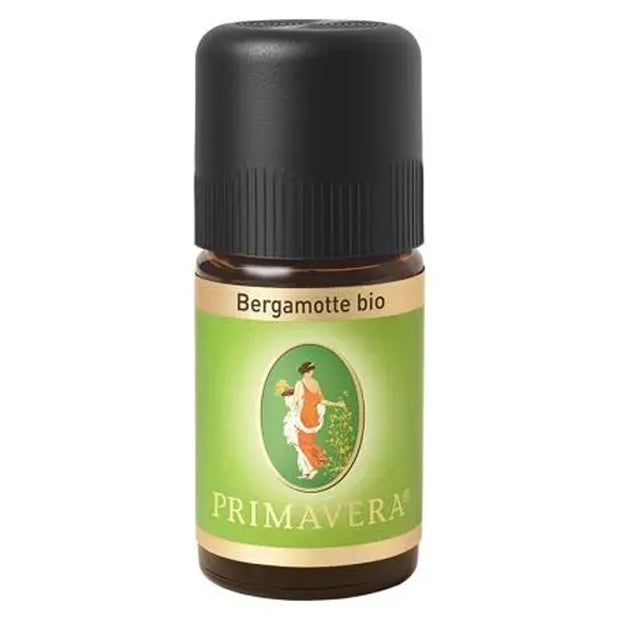
Bergamot organic
Bergamot is a citrus fruit mainly cultivated in Calabria, southern Italy. The bergamot tree grows up to 4 meters tall and is characterized by its evergreen, elongated leaves and white blossoms. The fruits of the bergamot are round to pear-shaped and have a sour taste; they are harvested between November and March. In perfumery, bergamot is mainly used as a top note in Eau de Cologne, where its fresh and citrusy fragrance is highly appreciated. In addition, bergamot is also used in food flavoring, for example to give Earl Grey tea its distinctive taste, which makes it particularly important in gastronomy. Directions for use: Cosmetic for skin aromatherapy. Max. 1 drop on 3 tablespoons of sea salt for a full bath. Composition: Citrus Aurantium Bergamia (Bergamot) Peel Oil* Org, Citral**, Limonene**, Linalool**. * from controlled organic cultivation ** natural components of the essential oil Notes: Store in a cool place. Keep out of reach of children. Legal notice: Not suitable for ingestion and declared as a cosmetic. They are therefore subject to the Cosmetics Regulation and the EU Directive for cosmetic products.
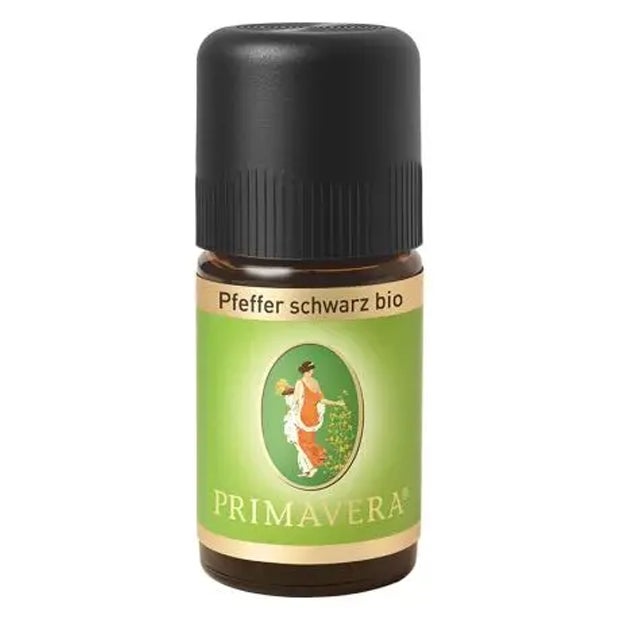
Black pepper organic
Black pepper, also known as Piper nigrum, is the dried fruit of the pepper vine, a climbing plant that grows mainly in the tropical regions of India and Southeast Asia. This plant can reach an impressive height of up to 10 meters and requires suitable support to grow. Black pepper is produced by drying the unripe, green fruits, which then develop their characteristic black color and intense aroma. This drying process makes pepper very durable, which made it a coveted trade good in ancient times. Due to its long shelf life and high culinary value, black pepper was once so valuable that it was referred to as "black gold." Today, black pepper is used in many ways. It is an essential spice in the kitchen and is added to a wide variety of dishes to give them heat and flavor. In addition, black pepper is also used in food flavoring and is a popular component of spice blends. Beyond culinary use, black pepper is also valued in perfumery for its spicy and earthy notes. The essential oils extracted from black pepper can also be used in aromatherapy to stimulate the senses and promote well-being. In summary, black pepper is a versatile spice with a rich history that continues to play an important role in modern cuisine and beyond. Its intense aroma and numerous health benefits make it an indispensable staple in many households. Directions for use: Cosmetic for skin aromatherapy. Max. 10 drops in 50 ml carrier oil. Composition: Piper Nigrum (Pepper) Fruit Oil* Org, Limonene**, Linalool**. * from controlled organic cultivation ** natural components of the essential oil Notes: Store in a cool place. Keep out of reach of children. Legal notice: Not suitable for ingestion and declared as a cosmetic. They are therefore subject to the Cosmetics Regulation and the EU Directive for cosmetic products.
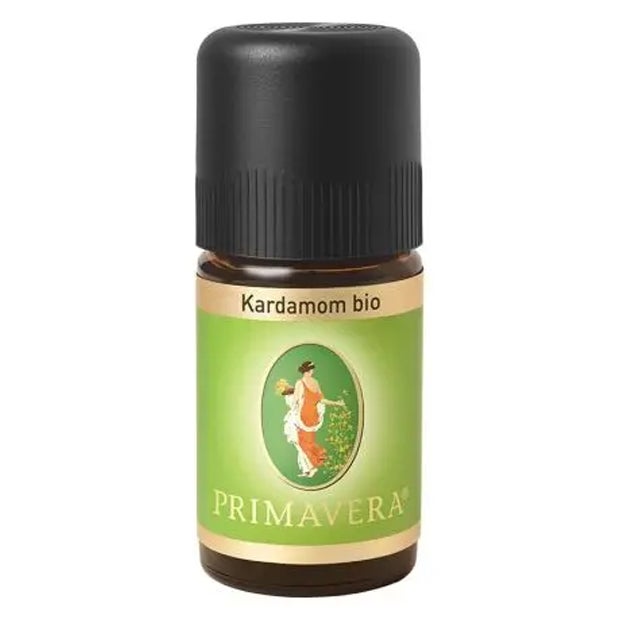
Cardamom organic
Cardamom is an aromatic spice plant that thrives in the moist mountain forests of India and Sri Lanka at altitudes between 750 and 1000 meters. This perennial plant can reach a height of up to 4 meters and is characterized by its large, lanceolate leaves and camphor-scented fruits, which are harvested from October to December. Cardamom is one of the oldest spices in the world and is often used in naturopathy to relieve digestive and urinary tract complaints. In addition, it plays a role in oral hygiene. In the kitchen, the capsule fruits and seeds are widely used; they are an essential component of curry blends, chai tea, Arabic mocha, Christmas pastries, and various liqueurs. Cardamom not only gives food and drinks a unique flavor but also brings health benefits. Directions for use: Cosmetic for skin aromatherapy. Max. 10 drops in 50 ml carrier oil. Composition: Elettaria Cardamomum Seed Oil Org, Citral, Geraniol, Limonene, Linalool. Notes: Store in a cool place. Keep out of reach of children. Legal notice: Not suitable for ingestion and declared as a cosmetic. They are therefore subject to the Cosmetics Regulation and the EU Directive for cosmetic products.
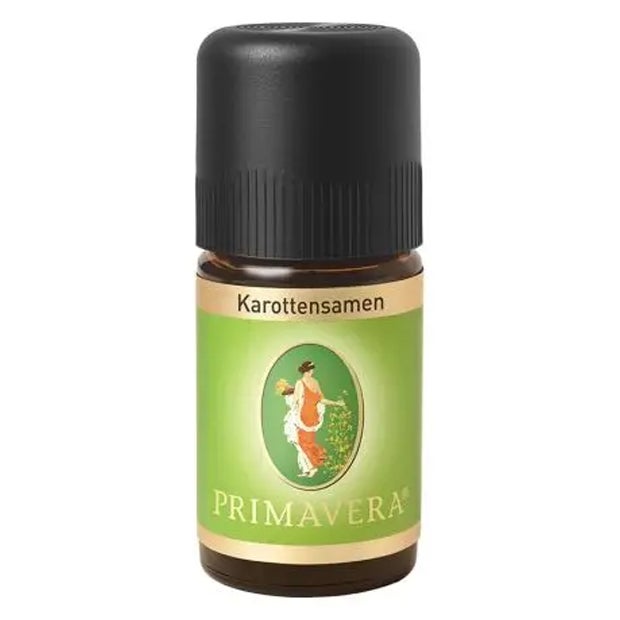
Carrot seed
The carrot, also known as carrot root, is a popular vegetable plant that thrives particularly well in deep sandy soil. This plant belongs to the Apiaceae family and produces characteristic umbels from which the aromatic seeds are obtained. In naturopathy, carrot seeds are used especially for loss of appetite as well as stomach and digestive complaints. Their healing properties are appreciated as they can promote digestion and support overall well-being. Carrots themselves are rich in nutrients and vitamins, especially beta-carotene, and are often consumed both raw and cooked in the kitchen. Directions for use: Cosmetic for skin aromatherapy. Max. 4 drops in 50 ml carrier oil. Composition: Daucus Carota Sativa (Carrot) Seed Oil, Geraniol**, Limonene**, Linalool**. ** natural components of the essential oil Notes: Store in a cool place. Keep out of reach of children. Legal notice: Not suitable for ingestion and declared as a cosmetic. They are therefore subject to the Cosmetics Regulation and the EU Directive for cosmetic products.

Cinnamon bark organic 60 %
The essential oil Ceylon cinnamon bark organic 60% exudes a sweet-bitter, spicy scent and belongs to the heart note in aromatherapy. This oil has a warming, stimulating, and inspiring fragrance theme that invigorates both body and mind. The "Ceylon" cinnamon bark comes from the cinnamon tree, a tropical evergreen tree native to Sri Lanka, South India, and Madagascar, which can reach heights of up to 15 meters. In cultivation, the cinnamon tree is usually cut back to keep it shrub-like and to promote the growth of new shoots. The harvested bark pieces are wrapped in mats and fermented, which contributes to the development of an intense aroma. Cinnamon is used not only as a spice and for flavoring foods but also as an essential oil. For the production of the essential oil, the shavings that occur during the production of cinnamon bark rolls and the spice processing of true Ceylon cinnamon are processed by steam distillation to extract the valuable aromatic substances. Directions for use: Cosmetic for skin aromatherapy. Max. 7 drops in 50 ml carrier oil. Composition: Organic alcohol*, organic cinnamon bark oil*, Cinnamal**, Eugenol**, Linalool**, Benzyl Benzoate**, Limonene**, Cinnamyl Alcohol**. * from controlled organic cultivation ** natural components of the essential oil Notes: Store in a cool place. Keep out of reach of children. Legal notice: Not suitable for ingestion and declared as a cosmetic. They are therefore subject to the Cosmetics Regulation and the EU Directive for cosmetic products.
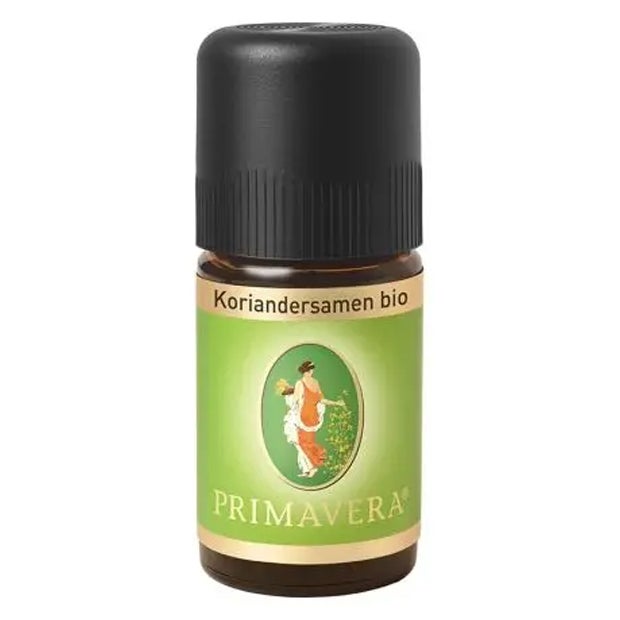
Coriander seed organic
In naturopathy, coriander is often used for stomach and digestive complaints. Its calming properties can help promote digestion and relieve bloating. In addition, coriander is widely used in cooking, especially in bread and curry spices, where it adds an aromatic note to dishes. Coriander is also often used in Christmas pastries and liqueurs, providing a special flavor. Furthermore, coriander is used in perfumery, where its characteristic scent is appreciated. The essential oils obtained from the leaves and seeds give perfumes a fresh and spicy note. Thus, coriander is not only a popular spice but also a valuable medicinal herb with a wide range of applications in cooking and cosmetics. Directions for use: Cosmetic for skin aromatherapy. Max. 5 drops in 50 ml carrier oil. Composition: Coriandrum Sativum (Coriander) Fruit Oil* Org, Geraniol**, Limonene**, Linalool**. * from controlled organic cultivation ** natural components of the essential oil Notes: Store in a cool place. Keep out of reach of children. Legal notice: Not suitable for ingestion and declared as a cosmetic. They are therefore subject to the Cosmetics Regulation and the EU Directive for cosmetic products.
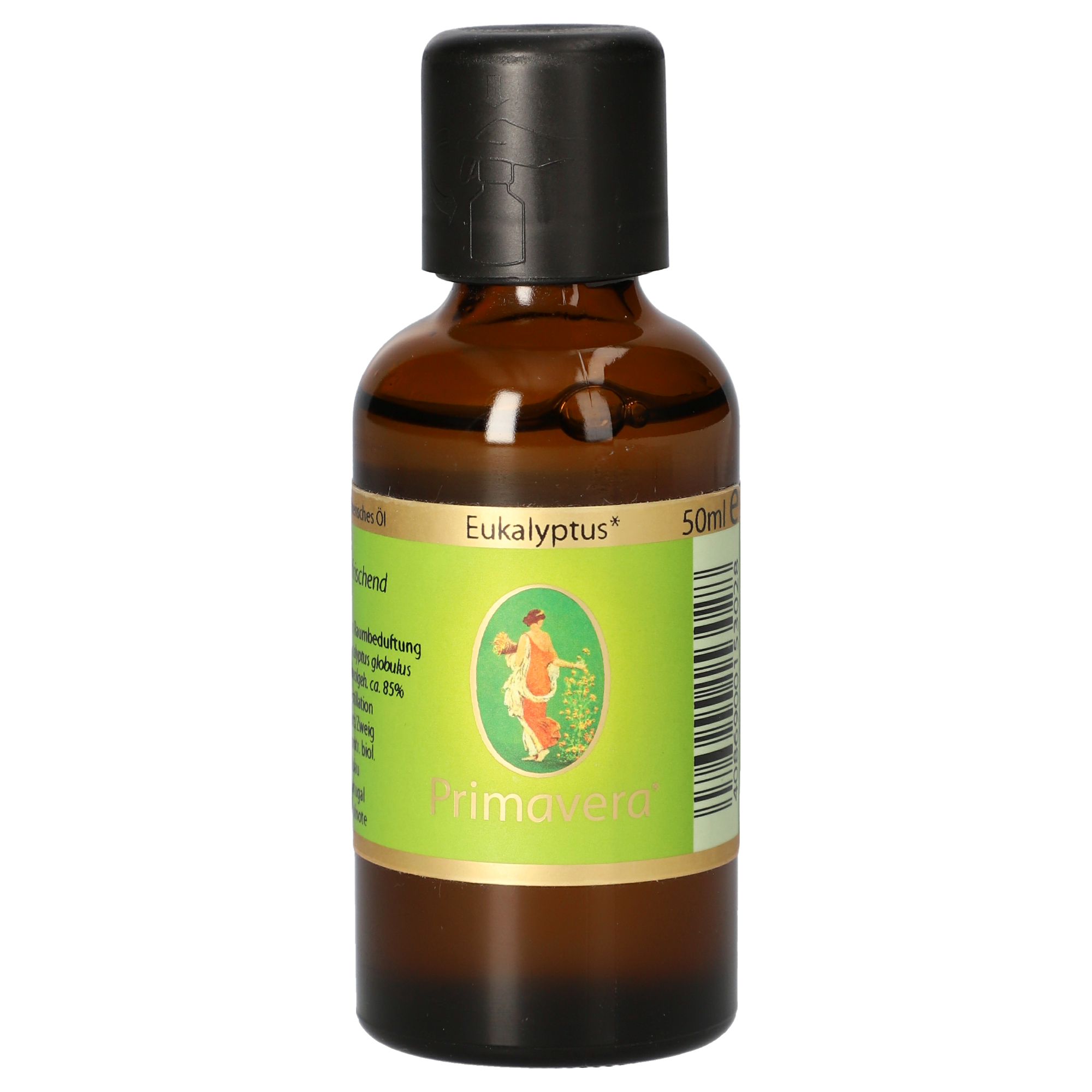
Eucalyptus brut (cineole 85 %)
The essential oil Eucalyptus brut (Cineole 85%) from Primavera is known for its fresh, clear, and invigorating fragrance. It is obtained from the leaves of the eucalyptus tree (Eucalyptus globulus) and is characterized by a high content of 1,8-cineole, a compound valued for its beneficial properties. The oil has an energizing and clarifying effect, often used to support the respiratory system. It can help ease breathing and promote overall well-being. Directions for use: Cosmetic for skin aromatherapy. Max. 10 drops in 50 ml carrier oil. Composition: 1,8-Cineole, α-Pinene, Limonene, Camphene, Borneol. Notes: Store in a cool place. Keep out of reach of children. Legal notice: Not suitable for ingestion and declared as a cosmetic. They are therefore subject to the Cosmetics Regulation and the EU Directive for cosmetic products.
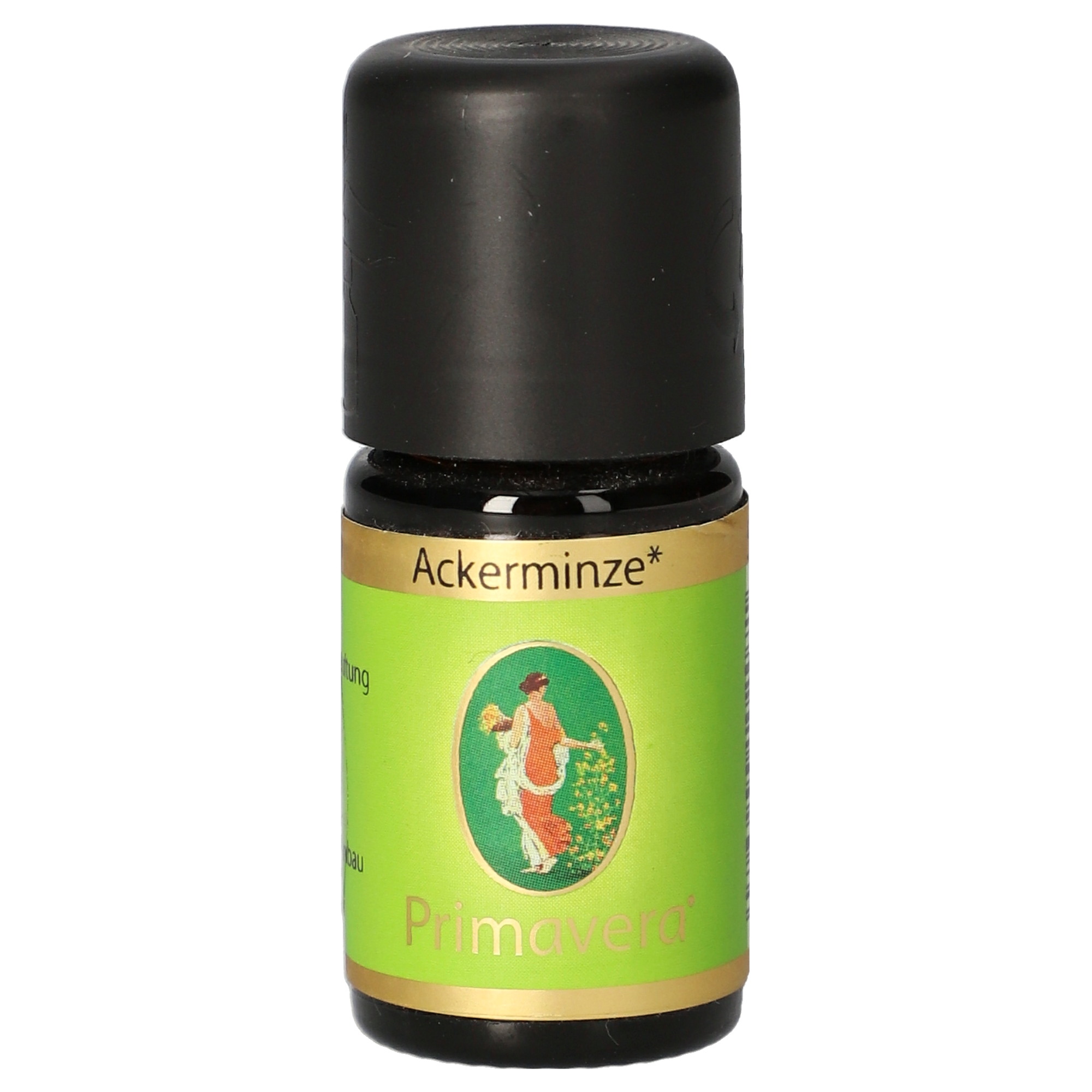
Field mint
Essential field mint oil is obtained by steam distillation of the entire herb of field mint. Characteristic of this plant, as well as peppermint, is the high menthol content, which gives it the typical mint scent. Essential field mint oil promotes concentration and, due to its fresh, clear fragrance, is ideal for improving indoor air. It clears the head and has a stimulating effect, particularly in states of exhaustion. Directions for use: Cosmetic for skin aromatherapy. Max. 2 drops in 50 ml carrier oil. Composition: Mentha Arvensis Oil* Org * from controlled organic cultivation Notes: Store in a cool place. Keep out of reach of children. Legal notice: Not suitable for ingestion and declared as a cosmetic. They are therefore subject to the Cosmetics Regulation and the EU Directive for cosmetic products.
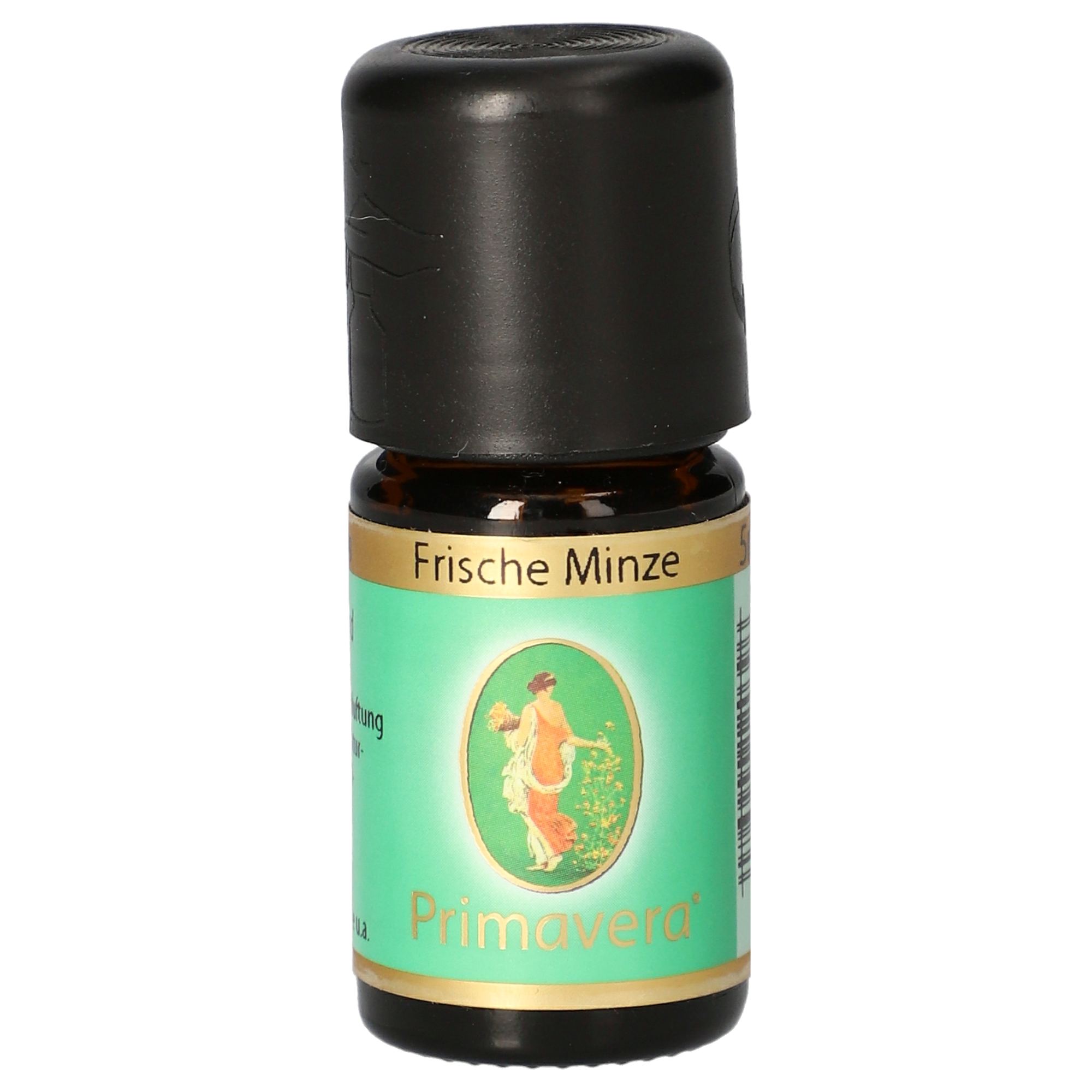
Fresh Mint
Fresh mint oil is particularly suitable for aromatherapy as it promotes concentration and helps dispel fatigue. It can be used in a diffuser to create a refreshing indoor fragrance. The oil is often used for headaches, especially tension and migraine headaches. In addition, it can support digestion and help with stomach complaints. It may also be added to massage oils to relax tense muscles and provide a cooling effect. Directions for use: Cosmetic for skin aromatherapy. Max. 10 drops in 50 ml carrier oil. Composition: Menthol, Menthone, 1,8-Cineole, Limonene, Caryophyllene. Notes: Store in a cool place. Keep out of reach of children. Legal notice: Not suitable for ingestion and declared as a cosmetic. They are therefore subject to the Cosmetics Regulation and the EU Directive for cosmetic products.
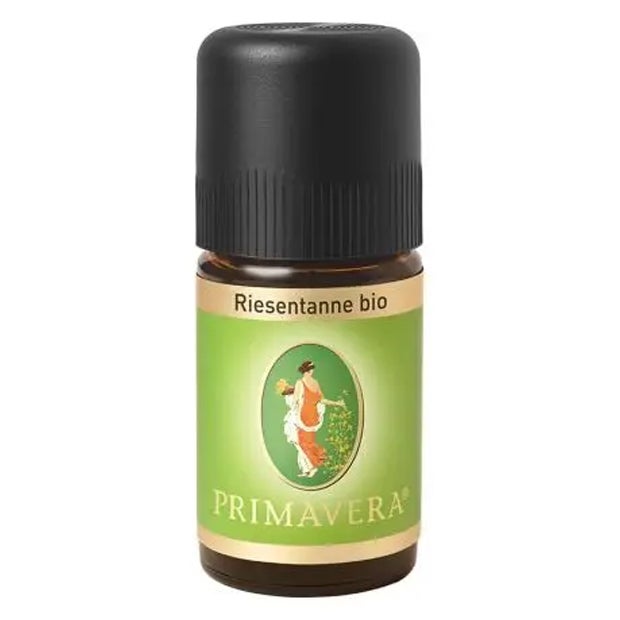
Giant fir organic
The giant fir is an impressive evergreen conifer that originally comes from North America. Today, the giant fir is also cultivated in Europe, particularly in the Massif Central region of France. This tree can reach a height of over 80 meters, making it one of the tallest conifers. A characteristic feature of the giant fir is its needles, which release a refreshing, citrus-like aroma when crushed. In naturopathy, giant fir is used for relieving cold symptoms thanks to the beneficial properties of its essential oils. In addition, it is valued for its ability to improve indoor air quality, creating a pleasant indoor atmosphere. Directions for use: Cosmetic for skin aromatherapy. Max. 3 drops in 50 ml carrier oil. Composition: Abies Alba Leaf Oil* Org, Limonene**, Citronellol**. * from controlled organic cultivation ** natural components of the essential oil Notes: Store in a cool place. Keep out of reach of children. Legal notice: Not suitable for ingestion and declared as a cosmetic. They are therefore subject to the Cosmetics Regulation and the EU Directive for cosmetic products.
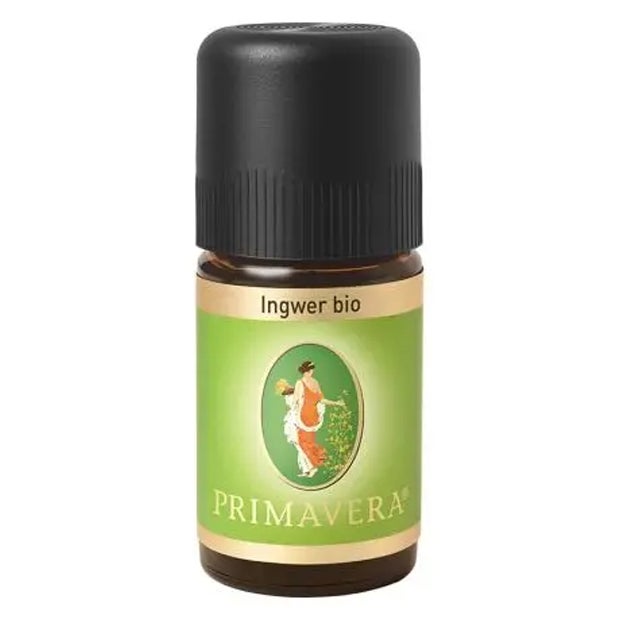
Ginger organic
Ginger oil is obtained from freshly distilled ginger root and is characterized by its pleasantly citrus-fresh scent, accompanied by a spicy, fruity note. It is mild and skin-friendly, making it excellent for various applications. Ginger oil is particularly beneficial for (travel) nausea, as it helps alleviate discomfort and promotes well-being in cases of gastrointestinal complaints. In addition, it has stabilizing and mood-enhancing effects, making it a valuable support in stressful times. Its aphrodisiac properties are also remarkable. In cases of nausea, simply inhaling the essential ginger oil can provide quick relief. In aromatherapy, it is often used in therapeutic blends to treat “emotional stomach aches,” as it has a balancing and emotionally stabilizing effect. Directions for use: Cosmetic for skin aromatherapy. Max. 2 drops in 50 ml carrier oil. Composition: Zingiber Officinale (Ginger) Root Oil* Org, Limonene**, Linalool**, Citral**, Geraniol**. * from controlled organic cultivation ** natural components of the essential oil Notes: Store in a cool place. Keep out of reach of children. Legal notice: Not suitable for ingestion and declared as a cosmetic. They are therefore subject to the Cosmetics Regulation and the EU Directive for cosmetic products.
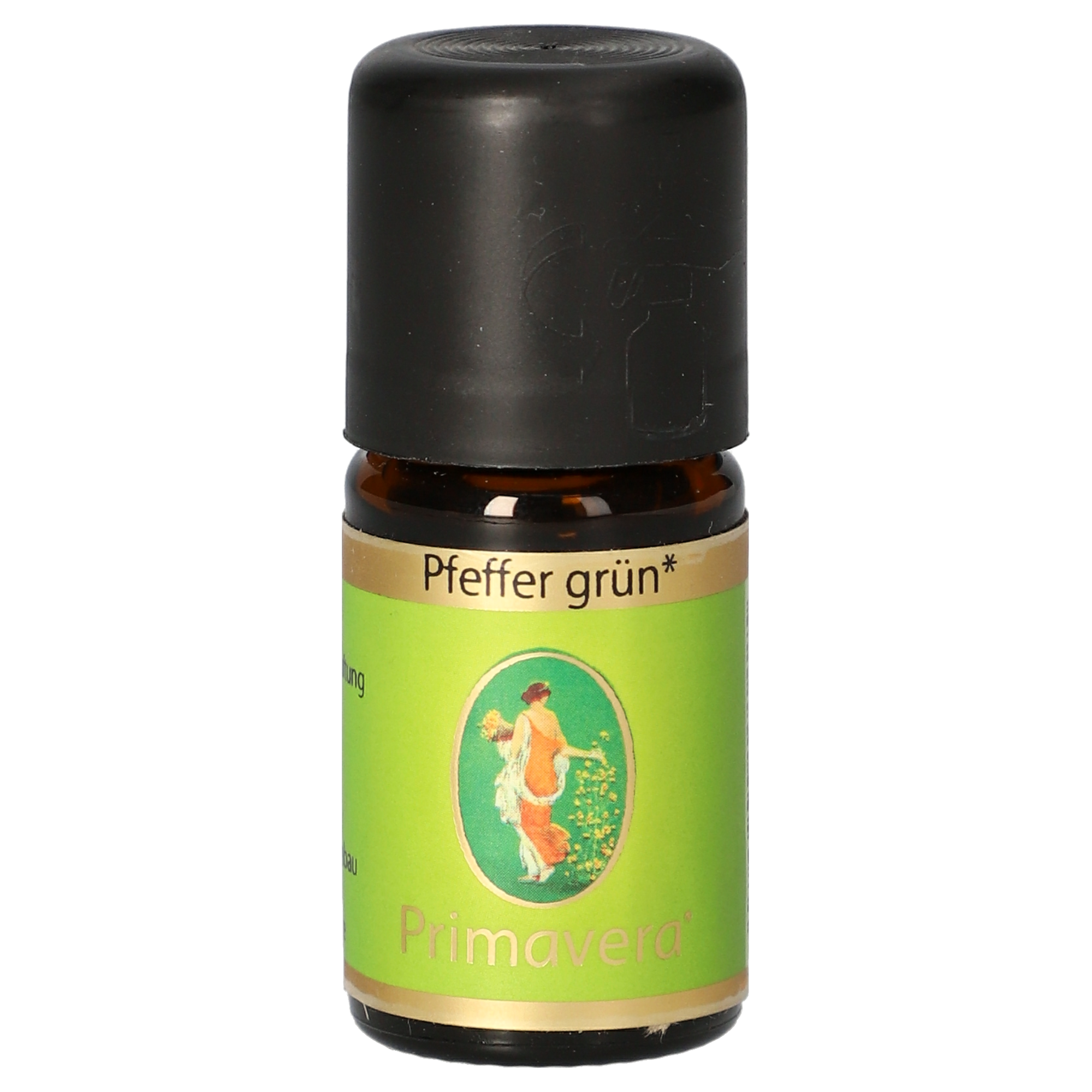
Green pepper organic
Directions for use: Cosmetic for skin aromatherapy. Max. 10 drops in 50 ml carrier oil. Composition: Elettaria Cardamomum Seed Oil Org, Citral, Geraniol, Limonene, Linalool. Notes: Store in a cool place. Keep out of reach of children. Legal notice: Not suitable for ingestion and declared as a cosmetic. They are therefore subject to the Cosmetics Regulation and the EU Directive for cosmetic products.

Hyssop organic
Hyssop (Hyssopus officinalis) is an ancient spice plant that originates from the Mediterranean region and Asia. This perennial herb can grow up to 60 cm tall and belongs to the mint family (Lamiaceae). Hyssop is known not only for its culinary uses but also as a valuable bee forage plant that attracts numerous insects and thus helps promote biodiversity. In cooking, hyssop is often used as a spice to refine dishes. Its aromatic flavor, reminiscent of a blend of mint and thyme, pairs perfectly with meat dishes, soups, salads, and sauces. In addition, hyssop is an ingredient of the traditional Chartreuse herbal liqueur, contributing to the complexity of its flavor profile. In naturopathy, hyssop is valued for its healing properties. It is often used to relieve colds and respiratory ailments due to its expectorant and anti-inflammatory effects. Furthermore, hyssop is also used to support digestion and may help with stomach discomfort and bloating. In summary, hyssop is a versatile plant used both in the kitchen and in natural medicine. Its aromatic qualities and health benefits make it a valuable addition to many households. Directions for use: Cosmetic for skin aromatherapy. Max. 3 drops in 50 ml carrier oil. Composition: Hyssopus Officinalis Leaf Oil* Org, Limonene**, Linalool**. * from controlled organic cultivation ** natural components of the essential oil Notes: Store in a cool place. Keep out of reach of children. Legal notice: Not suitable for ingestion and declared as a cosmetic. They are therefore subject to the Cosmetics Regulation and the EU Directive for cosmetic products.
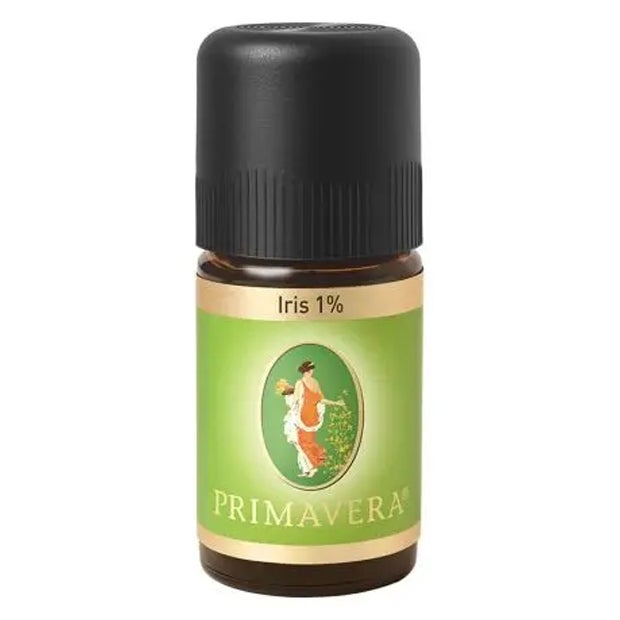
Iris 1 %
Iris, also known as orris or sword lily, is a perennial plant distinguished by its sword-shaped, blue flowers and is mainly cultivated today in Italy. Named after the goddess of the rainbow, the plant was already valued in ancient Rome and Greece as a fragrance and medicinal herb, particularly for the treatment of skin and respiratory ailments. In cosmetics and perfumery, iris is used as a precious fixative and is considered one of the most expensive fragrance substances in the world. The production of iris oil is elaborate: after peeling, cutting, and drying the roots, they undergo a careful three-year aging process, followed by further processing to first obtain the concrete and finally the pure iris oil. Directions for use: Cosmetic for skin aromatherapy. Max. 20 drops in 50 ml carrier oil. Composition: Alcohol* Org, Iris Pallida Root Extract, Michelia Champaca Flower Extract, Linalool**. * from controlled organic cultivation ** natural component of the essential oil Notes: Store in a cool place. Keep out of reach of children. Legal notice: Not suitable for ingestion and declared as a cosmetic. They are therefore subject to the Cosmetics Regulation and the EU Directive for cosmetic products.
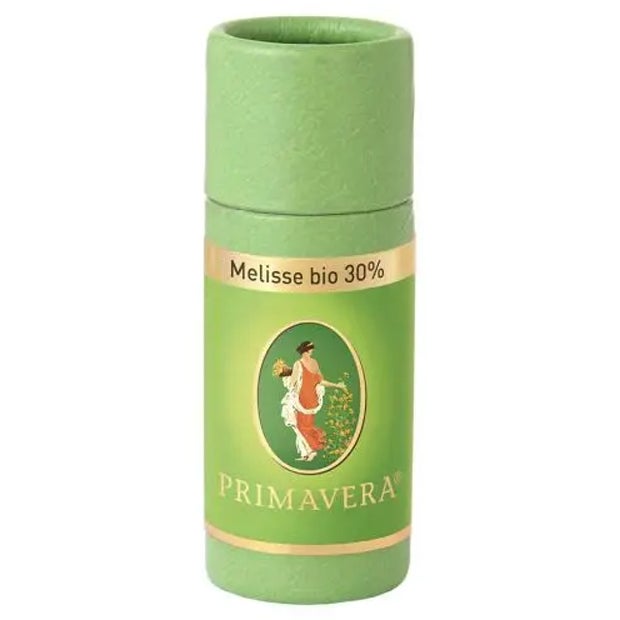
Lemon balm organic 30 %
Lemon balm, also known as Melissa, is a perennial herbaceous plant distinguished by its pleasant, lemon-like fragrance and thriving mainly in temperate, warm climates. It grows up to 1 meter tall and bears small white flowers as well as strongly scented, oval-shaped leaves. Traditionally, lemon balm is also called "bee leaf" or "honey flower" because its scent attracts bees. In naturopathy, lemon balm is widely used; it is known for its calming properties and is applied for skin, respiratory, and stomach complaints, as well as for relieving tension and insomnia. Directions for use: Cosmetic for skin aromatherapy. Max. 6 drops in 50 ml carrier oil. Composition: Lavandula Angustifolia (Lavender) Oil* Org, Melissa Officinalis Flower/Leaf/Stem Oil* Org, Citral**, Geraniol**, Citronellol**, Limonene**, Linalool**. * from controlled organic cultivation ** natural components of the essential oil Notes: Store in a cool place. Keep out of reach of children. Legal notice: Not suitable for ingestion and declared as a cosmetic. They are therefore subject to the Cosmetics Regulation and the EU Directive for cosmetic products.
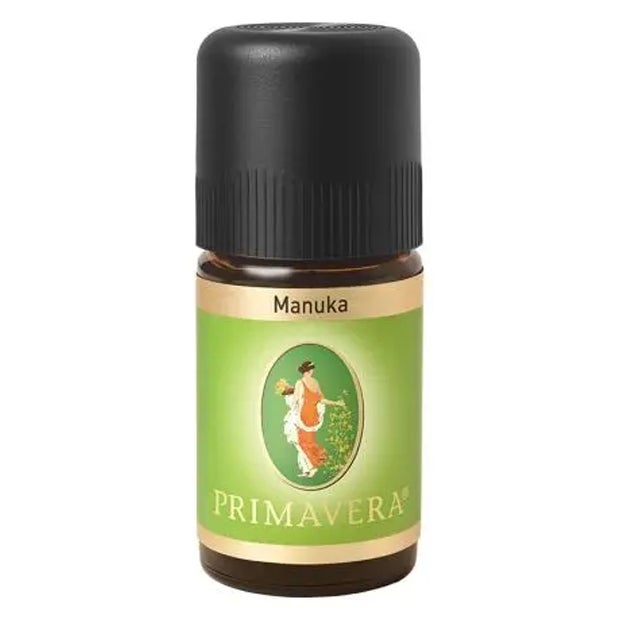
Manuka
Manuka, also known as New Zealand tea tree, is a hardy shrub originally from New Zealand and Australia. This shrub belongs to the Melaleuca family and is characterized by its attractive white-pink flowers. Manuka is valued in naturopathy for its versatile properties and is used in various applications. The essential oil of the Manuka plant is often used to relieve skin problems. It has anti-inflammatory and antiseptic properties that can be helpful in treating skin irritations, wounds, and acne. In addition, Manuka is also used for colds, as it can support the respiratory system and help relieve coughs. Another benefit of Manuka is its ability to improve indoor air quality. The oil can be used to purify the air and create a pleasant atmosphere indoors. In summary, Manuka is a versatile oil with cleansing and strengthening properties. It is particularly helpful in times of exhaustion and tension, as it can help reduce stress and promote overall well-being. Whether in aromatherapy, skin care, or for improving indoor air – Manuka is a valuable oil for many uses. Directions for use: Cosmetic for skin aromatherapy. Max. 2 drops in 50 ml carrier oil. Composition: Leptospermum Scoparium Branch/Leaf Oil, Limonene**, Linalool** from wild collection, ** natural components of the essential oil Notes: Store in a cool place. Keep out of reach of children. Legal notice: Not suitable for ingestion and declared as a cosmetic. They are therefore subject to the Cosmetics Regulation and the EU Directive for cosmetic products.
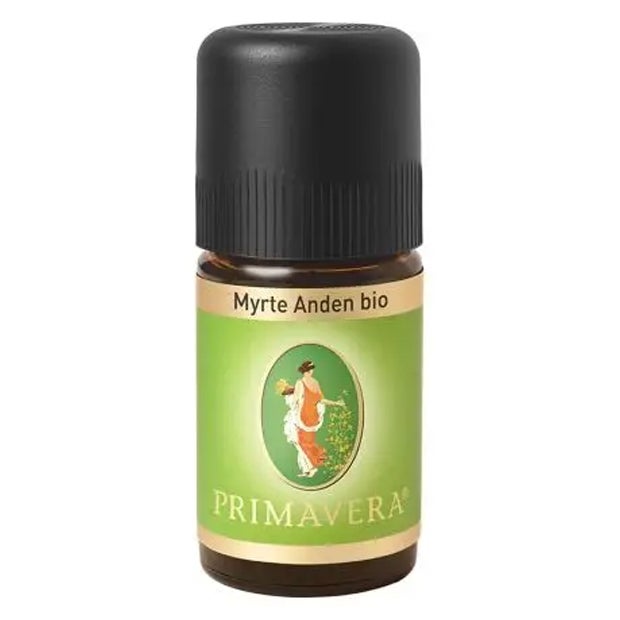
Myrtle Andean organic
Andean myrtle is an evergreen shrub native to the highlands of Peru. The plant is characterized by its lanceolate, small leaves and pretty white flowers that create a pleasant atmosphere. In naturopathy, Andean myrtle is often used to relieve respiratory complaints, as its essential oils have calming and freeing properties. In addition, it is valued for improving indoor air quality by creating a fresh and cleansing environment. Directions for use: Cosmetic for skin aromatherapy. Max. 7 drops in 50 ml carrier oil. Composition: Myrtus Communis Oil* Org, Geraniol**, Limonene**, Linalool**. * from controlled organic cultivation ** natural components of the essential oil Notes: Store in a cool place. Keep out of reach of children. Legal notice: Not suitable for ingestion and declared as a cosmetic. They are therefore subject to the Cosmetics Regulation and the EU Directive for cosmetic products.
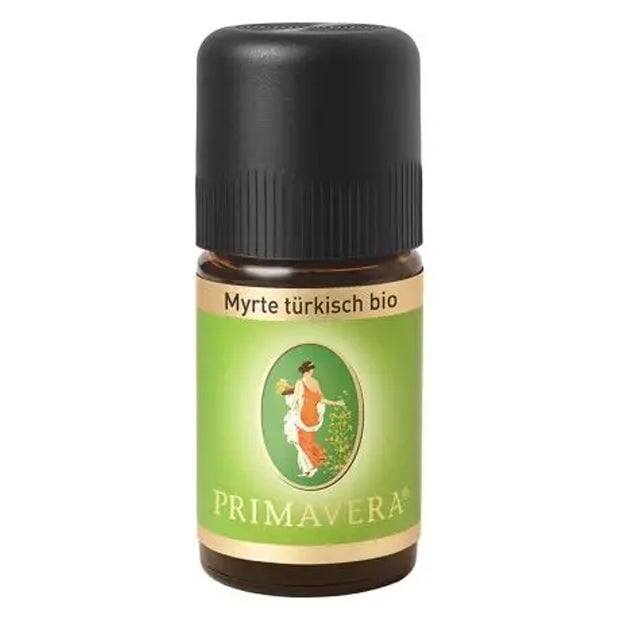
Myrtle Turkish organic
Myrtle, also known as bridal myrtle, is an evergreen shrub mainly found in the Mediterranean region. The aromatic leaves and berries of the myrtle are often used and valued. Historically, myrtle was dedicated to the goddess Aphrodite and still plays an important role in wedding culture today, as it is often included in bridal bouquets. The distillation water of myrtle, known as angel water or "Eau d’anges," is appreciated for its reputed skin-rejuvenating properties and is said to contribute to a flawless complexion. In naturopathy, myrtle is used for various skin problems as well as respiratory complaints, highlighting its versatile significance as a medicinal plant. Directions for use: Cosmetic for skin aromatherapy. Max. 1 drop in 50 ml carrier oil. Composition: Myrtus Communis Oil* Org, Citronellol**, Limonene**, Linalool**. * from controlled organic cultivation ** natural components of the essential oil Notes: Store in a cool place. Keep out of reach of children. Legal notice: Not suitable for ingestion and declared as a cosmetic. They are therefore subject to the Cosmetics Regulation and the EU Directive for cosmetic products.
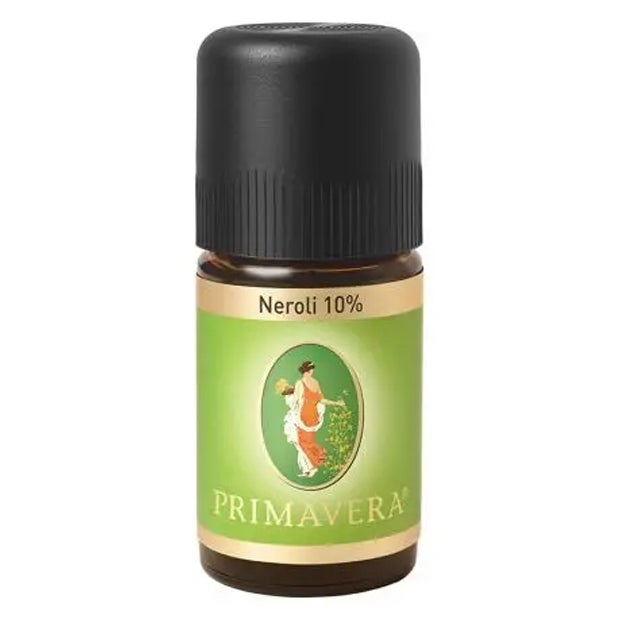
Neroli 10 %
Neroli is the essential oil obtained from the blossoms of the bitter orange tree (Citrus aurantium), which is cultivated in Sicily, North Africa, and Egypt. In addition to neroli, the bitter orange tree also provides two other oils: petitgrain, obtained from the leaves, and the fruit peel oil. Neroli is considered a valuable raw material in perfumery and is appreciated for its floral, fresh scent. In naturopathy, neroli is used for skin problems and is often applied to relieve nervous tension due to its calming properties. Directions for use: Cosmetic for skin aromatherapy. Max. 5 drops in 50 ml carrier oil. Composition: Citrus Aurantium Amara (Bitter Orange) Flower Oil, Geraniol**, Farnesol**, Limonene**, Linalool**. ** natural components of the essential oil Notes: Store in a cool place. Keep out of reach of children. Legal notice: Not suitable for ingestion and declared as a cosmetic. They are therefore subject to the Cosmetics Regulation and the EU Directive for cosmetic products.
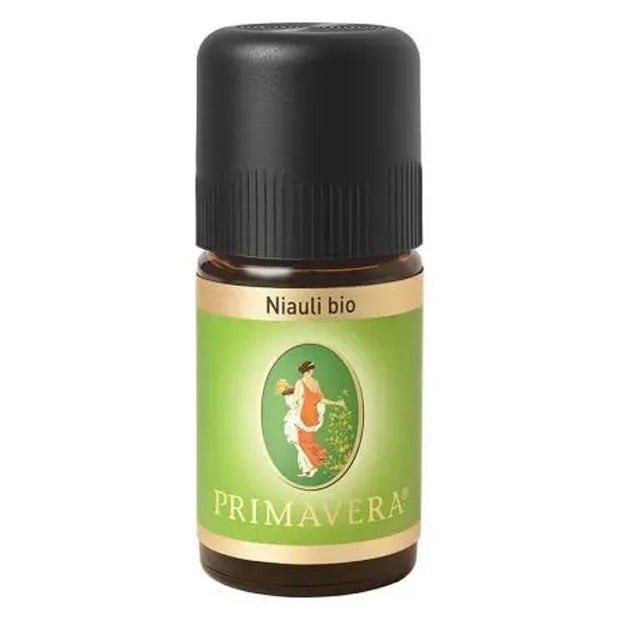
Niaouli organic
Niaouli is an evergreen tree mainly found in Australia and New Caledonia. It belongs to the Melaleuca family, similar to the tea tree, and is characterized by its fresh, aromatic scent reminiscent of cajeput. In naturopathy, niaouli is often used to relieve colds, muscle, and joint complaints. It is also valued for improving indoor air quality and creating a pleasant, healthy atmosphere. Directions for use: Cosmetic for skin aromatherapy. Max. 6 drops in 50 ml carrier oil. Composition: Melaleuca Viridiflora Leaf Oil* Org, Limonene**, Linalool**. * from controlled organic cultivation ** natural components of the essential oil Notes: Store in a cool place. Keep out of reach of children. Legal notice: Not suitable for ingestion and declared as a cosmetic. They are therefore subject to the Cosmetics Regulation and the EU Directive for cosmetic products.
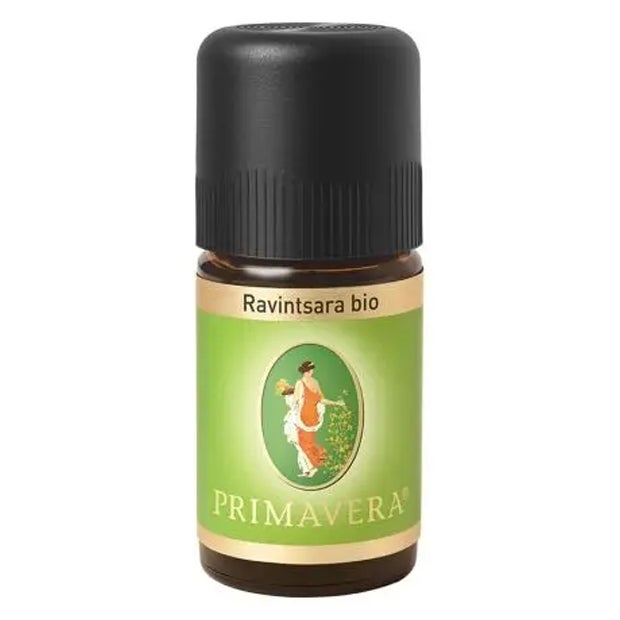
Ravintsara organic
Ravintsara is an evergreen camphor tree that thrives in the tropical regions of Madagascar and can reach impressive heights of over 30 meters. Depending on its origin, this tree develops different chemotypes, with the cineole chemotype being particularly noteworthy. In naturopathy, ravintsara is often used to relieve cold symptoms due to its beneficial properties. In addition, the essential oil of ravintsara is valued for improving indoor air quality, helping to create a fresh and healthy atmosphere. Directions for use: Cosmetic for skin aromatherapy. Max. 15 drops in 50 ml carrier oil. Composition: Cinnamomum Camphora Branch/Stem Oil* Org, Limonene**. * from controlled organic cultivation ** natural component of the essential oil Notes: Store in a cool place. Keep out of reach of children. Legal notice: Not suitable for ingestion and declared as a cosmetic. They are therefore subject to the Cosmetics Regulation and the EU Directive for cosmetic products.
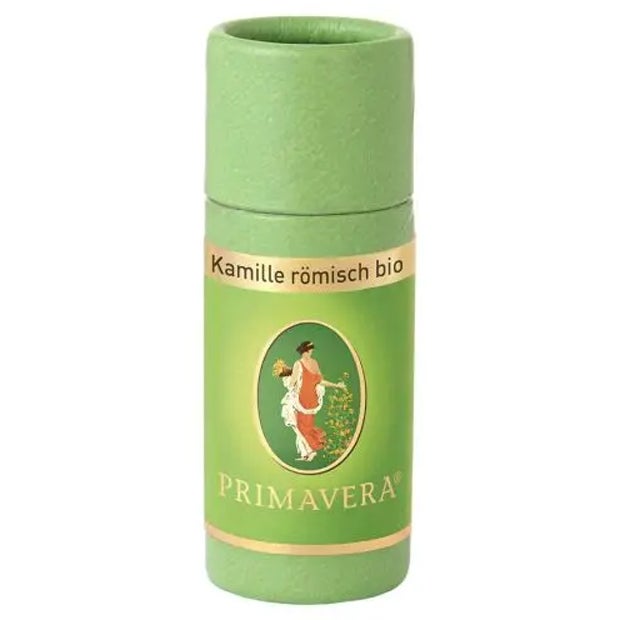
Roman chamomile organic
Roman chamomile has a long history as a medicinal plant, dating back to ancient times. In naturopathy, it is valued for its diverse healing properties. The most common applications include: Respiratory conditions: Roman chamomile can help relieve symptoms of colds, coughs, and respiratory inflammation. It has anti-inflammatory effects and can soothe the mucous membranes. Digestive issues: The calming properties of Roman chamomile help with stomach cramps, bloating, and other digestive disorders. It can promote digestion and improve overall well-being in the gastrointestinal tract. Skin problems: Roman chamomile has anti-inflammatory and antimicrobial properties that make it useful for skin irritations, eczema, and other dermatological complaints. It can be used in the form of infusions or as an ingredient in skincare products. The essential oil of Roman chamomile is used in aromatherapy and can help with relaxation and stress relief. Roman chamomile is a valuable natural remedy with a wide range of health benefits and applications, distinguished by its soothing properties. Directions for use: Cosmetic for skin aromatherapy. Max. 5 drops in 50 ml carrier oil. Composition: Anthemis Nobilis Flower Oil* Org, Limonene**. * from controlled organic cultivation ** natural components of the essential oil Notes: Store in a cool place. Keep out of reach of children. Legal notice: Not suitable for ingestion and declared as a cosmetic. They are therefore subject to the Cosmetics Regulation and the EU Directive for cosmetic products.
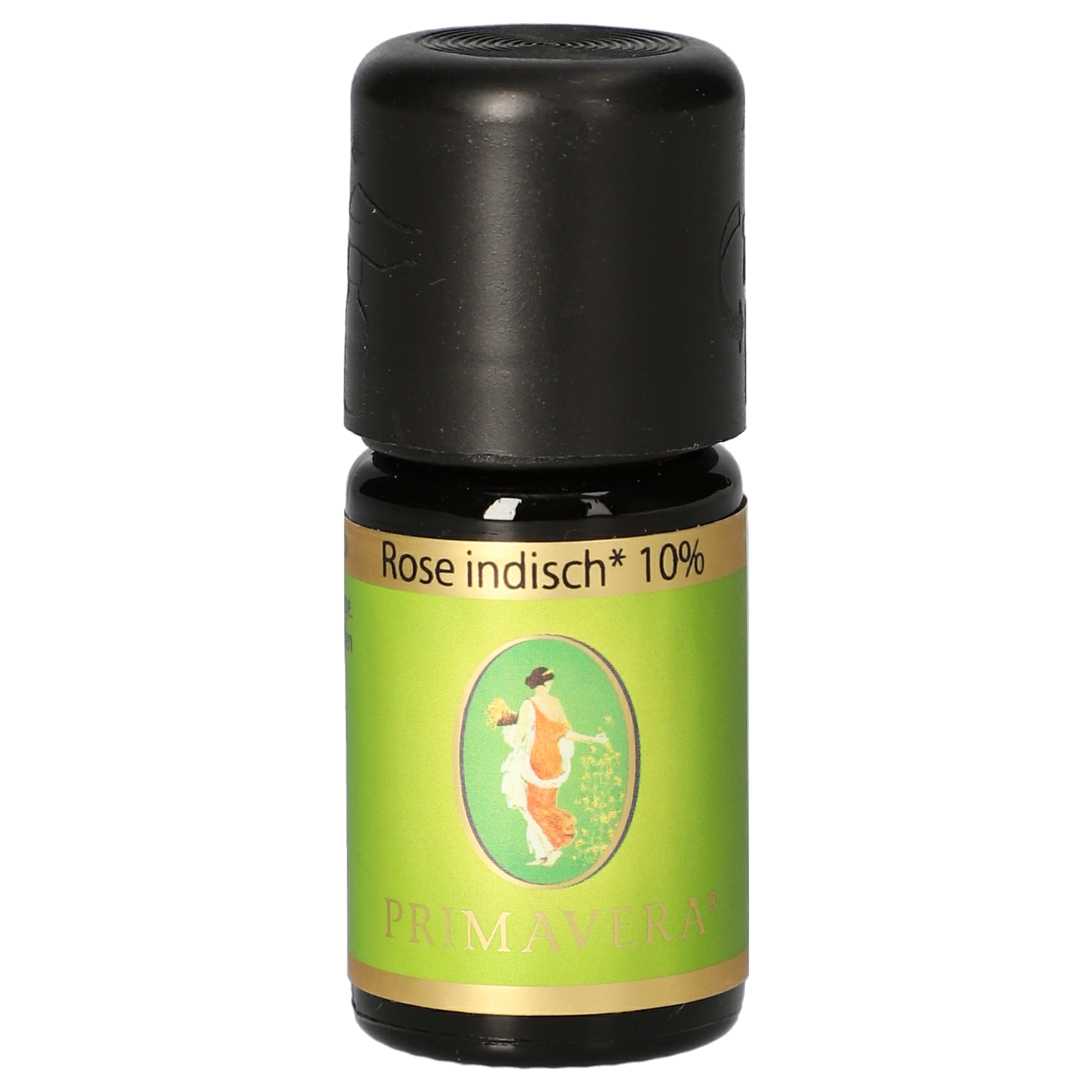
Rose Indian organic 10 %
The rose is a deciduous shrub and is regarded as the "queen of flowers"; it has given its name to the entire plant genus. The essential oil of the Indian rose, also known as Rosa damascena or Damask rose, is obtained from the blossoms of the plant. Some of the properties and effects of Damask rose essential oil include relaxing and stress-relieving, skin-caring and antioxidant, aphrodisiac and emotionally supportive. The concentration of 10% refers to the dilution of the essential oil in a carrier oil. Directions for use: Cosmetic for skin aromatherapy. Max. 4 drops in 50 ml carrier oil. Composition: Alcohol* Org, Rosa Damascena Flower Oil* Org, Citral**, Eugenol**, Geraniol**, Citronellol**, Linalool**. * from controlled organic cultivation ** natural components of the essential oil Notes: Store in a cool place. Keep out of reach of children. Legal notice: Not suitable for ingestion and declared as a cosmetic. They are therefore subject to the Cosmetics Regulation and the EU Directive for cosmetic products.

Silver fir organic
In naturopathy, silver fir (Abies alba) is valued for its diverse healing properties. Its needles and resin contain essential oils that can help relieve cold symptoms. These oils have antiseptic and anti-inflammatory effects that help clear the airways and support recovery. Infusions or inhalations with silver fir needles can also be beneficial for coughs and colds. In addition, silver fir is used to relieve muscle discomfort. Baths or compresses with silver fir extracts can have a relaxing effect and help release muscle tension. Another benefit of silver fir is its ability to improve indoor air. The essential oils of the needles can help purify the air and create a pleasant, fresh atmosphere. This makes silver fir a popular choice for use in aromatherapy and room diffusers. Overall, silver fir is a valuable tree that impresses not only with its majestic appearance but also with numerous health benefits. Its versatile uses in naturopathy and for improving indoor air quality make it a cherished plant in many households. Directions for use: Cosmetic for skin aromatherapy. Max. 4 drops in 50 ml carrier oil. Composition: Abies Alba Leaf Oil* Org, Limonene**, Linalool**. * from controlled organic cultivation ** natural components of the essential oil Notes: Store in a cool place. Keep out of reach of children. Legal notice: Not suitable for ingestion and declared as a cosmetic. They are therefore subject to the Cosmetics Regulation and the EU Directive for cosmetic products.
